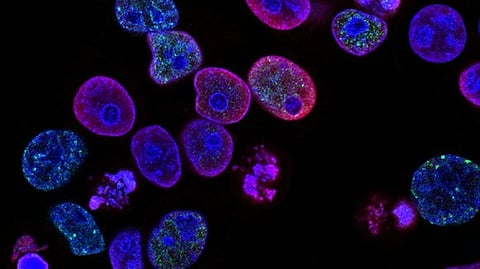Myeloma is a scarce blood tumor resulting from the unchecked proliferation of unusual plasma cells. These plasma cells are a distinct variety of leukocytes that perform a crucial function in the immune system by creating vital antibodies in the lymph nodes and bone marrow.
Despite the availability of more drugs and treatment options, including immunotherapy, the illness remains incurable. Patients have an average life expectancy of only five years after being diagnosed.
The major obstacle is the cancer's propensity to recur despite treatment. This is due to the fact that treatment increases the cancer cells' resistance to the administered drugs, eventually rendering all available options ineffective after multiple rounds of treatment.
In an effort to tackle this problem, ETH scientists have modified their screening platform to search for solutions and provide new prospects for more successful treatment outcomes.
Biopsies under the microscope
The team is utilizing a high-throughput screening technique known as pharmacoscopy, which was created by Professor Berend Snijder, to assess the efficacy of different treatments on the cancer cells of each patient.
This cutting-edge approach enables hundreds of distinct treatment combinations to be examined simultaneously outside the body. By analyzing the cell's response to each treatment, the team can determine which strategy holds the greatest potential for each individual patient.
To achieve this, the biopsied cells are positioned in specialized plates with 384 small wells, each with a different blend of prospective treatment compounds. After 24 hours, the cells are marked with distinct antibodies, and their reactions are evaluated using images captured by automated microscopy. A deep-learning algorithm is subsequently employed to recognize and categorize the various cell types. The process is mostly automated, resulting in efficient and precise analysis of the outcomes.
138 biopsies individually tested
The scientists employed pharmacoscopy to meticulously investigate 138 bone marrow biopsies from 89 myeloma patients with varying stages of the disease, ranging from newly diagnosed and untreated to patients who had undergone several rounds of treatment.
The objective was to observe how the cancer cells reacted to various approved drugs and drug combinations in each biopsy. By analyzing the cells' characteristics, the team could determine the most effective treatment alternative for each patient.
Although the Snijder laboratory had previously applied pharmacoscopy in comparable investigations on other types of blood cancer, such as lymphomas and leukemias, the platform had to be customized for this specific myeloma study.
Hope for more effective treatments
The pioneering research carried out by the team at ETH and University Hospital Zurich provides optimism for more efficient treatment options for multiple myeloma. By using pharmacoscopy to analyze hundreds of treatments, the scientists were able to identify novel and more effective treatment choices for each patient.
This innovative personalized medicine approach is translatable to the clinic, allowing doctors to identify the optimal treatment alternative for their patients at an early stage. "Nevertheless, we must first verify the technique more extensively in clinical trials," Snijder remarked.
The Snijder laboratory intends to enhance the platform and broaden its application to solid tumors. Unlike blood cancers, solid tumors must be partially dissociated before they can be tested in the 384-well plate format. The team is currently adapting the screening platform to accommodate brain tumors, among other solid tumors. (PB/Newswise)


